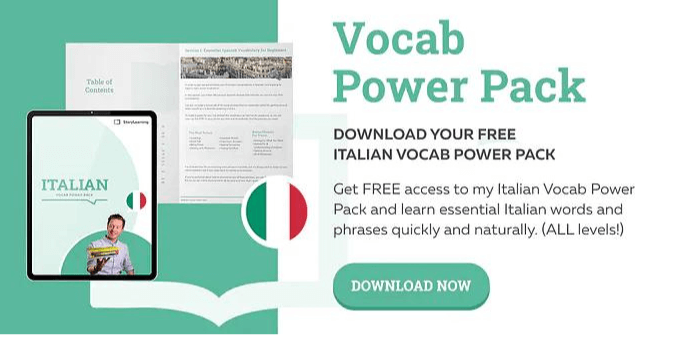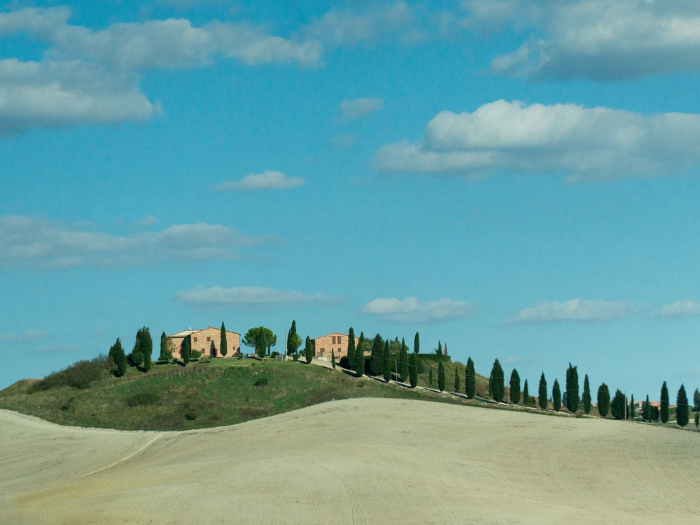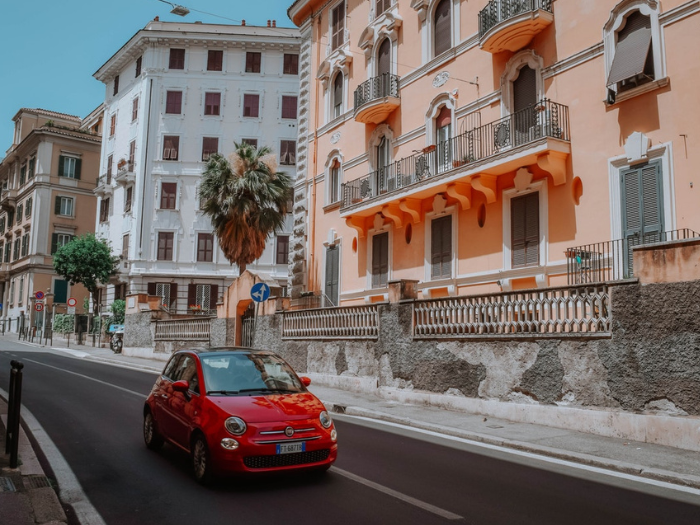Did you know that as an Italian learner, you're learning a language with a rich vocabulary, one of the richest in the world even?
Of course, this may suggest that learning Italian is difficult (spoiler: it is not ). But I have two excellent pieces of news for you.
The first is that despite the large number of words that make up the Italian language, you only need a limited number to be understood.
The second is that in this article you'll discover an Italian verbs list of the 158 most used Italian verbs. By knowing them you'll be able to express yourself in (almost) every situation!
And there’s a bonus: if you want to learn Italian effectively and quickly without getting bored, I have the course for you.
Italian Uncovered will help you speak Italian quickly while having fun thanks to the StoryLearning® method, which teaches you the language thanks to the power of stories.
Start your 7-day free trial now and learn Italian in a fun and effective way!
Table of Contents
Why Is Learning the Most Common Verbs In Italian Important?

Many people think that to speak a language and be understood it is necessary to know all the vocabulary by heart.
Fortunately, this is not the case. In Italian, as in all other languages, there is a well-defined group of common nouns and common Italian verbs you'll need to be able to have a conversation about different topics.
Of course, once you have started studying you'll need to learn how to conjugate verbs in Italian. But this is the next step.
Knowing the most important Italian verbs allows you to have a basis on which to work and easily get to the next level, without being discouraged.
The Hands-On Guide to the 158 Most Common Italian Verbs
To make learning easier, I've prepared an Italian verbs list with English meanings and examples to help you navigate the most common situations and conversations.
Are you ready? Let's see get to looking at the top Italian verbs together!

1. Affidarsi (To Rely On)
– Per la spedizione Melinda si è affidata al corriere più famoso (For the shipment, Melinda relied on the most famous courier)
2. Accompagnare (To Accompany/To Walk Somebody To)
– Giovanni ha accompagnato Roberta a casa (Giovanni walked Roberta home)
3. Affacciarsi (To Look Out)
– Mi sono affacciato alla finestra per vedere il tramonto (I looked out the window to see the sunset)
4. Allontanarsi (To Step Away)
– La guardia ci chiese di allontanarci dal cancello (The guard asked us to step away from the gate)
5. Alzarsi (To Get Up)
– Appena finito il caffè, Giorgio si alzò da tavola (As soon as the coffee was finished, Giorgio got up from the table)
6. Amare (To Love)
– Amo moltissimo la musica rock (I love rock music very much)
– Giovanna e Ludovico si amano (Giovanna and Ludovico love each other)
Note: the verb amare in Italian can be used with the same meaning as “to love” in English in the case of a deep love for a thing or a romantic one for a person.
However, amare generally does not include family relationships or friendships, for which the expression voler bene is used. For example, we use amare in these cases:
– Gli sposi si amano (The bride and the groom love each other)
– Aurelio ama la letteratura russa (Aurelio loves Russian literature)
But we use voler bene in these others:
– Martina vuole bene alla zia (Martina loves her aunt)
– Marcello e Tiziana sono amici e si vogliono bene (Marcello and Tiziana are friends, and they love each other)
Contrary to amare, voler bene is only used in interpersonal relationships and never towards inanimate objects.
7. Ammalarsi (To Get Sick)
– Lucia non può andare a scuola perché si è ammalata di nuovo (Lucia cannot go to school because she got sick again)
8. Andare (To Go)
– Ho voglia di andare al mare (I want to go to the beach)
9. Annuire (To Nod)
– Quando ti chiede se hai fatto i compiti, tu annuisci (When they ask if you've done your homework, you nod)

10. Annoiare (To Bore)
– Se l’intervista è troppo lunga, annoiamo il lettore (If the interview is too long, we bore the reader)
11. Approfittare/Approfittarsi (To Take Advantage/To Take Advantage Of Something/Someone)
– Approfitto volentieri della tua offerta di fermarmi a dormire (I gladly take advantage of your offer to stay and sleep at your home)
– Camilla è gentile e Michele se ne approfitta (Camilla is kind and Michele takes advantage of it)
The verb approfittare can have both positive and negative connotations, while approfittarsi always implies a negative intention.
As the example shows, I can use approfittare when I take advantage of someone's offer (or a discount, a special offer, a free ticket, etc.). But approfitarsi always means taking advantage of someone's kindness or a situation at the expense of others.
12. Aprire (To Open)
– Fa troppo caldo, dì ad Andrea di aprire la finestra (It's too hot, tell Andrea to open the window)
13. Arrabbiarsi (To Get Angry)
– Alla terza volta che veniva interrotto, Aurelio si è arrabbiato (On the third time he was interrupted, Aurelio got angry)
14. Ascoltare (To Listen)
– Ascoltare il suono della pioggia sul tetto è rilassante (Listening to the sound of rain on the roof is relaxing)
15. Aspettare/Attendere (To Wait)
– Ho aspettato l'autobus per quaranta minuti, ma non è passato (I waited for the bus for forty minutes, but it didn't pass)
– Aspetta un attimo! (Wait a moment!)
– I passeggeri sono pregati di attendere all’imbarco (Passengers are requested to wait at the gate)
The verbs aspettare and attendere are synonymous and both correspond to the English verb “to wait”.
However, there is a difference in the context in which they are commonly used:
aspettare has a more colloquial and informal connotation, while attendere is used in official and formal contexts.
As the examples show, in everyday speech we can use aspettare like in Ho aspettato l'autobus (I waited for the bus), or Aspetta! (Wait!), while it would sound unusual, formal and archaic to use instead Ho atteso l'autobus or Attendi!
In the same way, in an official communication such as an announcement for passengers at the airport, an Italian speaker would use attendere, as it would be out of tone and too colloquial to use aspettare.

16. Assaggiare (To Taste)
– Hai mai assaggiato la vera pizza napoletana? (Have you ever tasted the real Neapolitan pizza?)
17. Assomigliare (To Look Like)
– Carla assomiglia ad Andreina, ma non è sua sorella (Carla looks like Andreina, but she is not her sister)
18. Avere (To Have/To Own/To Be Hungry/To Be Tired/To Be In A Hurry)
– In tasca ho cinque euro e sessantasette centesimi (I have five euros and sixty-seven cents in my pocket)
– Alessia ha un meraviglioso cappotto rosso (Alessia has a wonderful red coat)
– Leone ha bisogno di riposare a lungo prima di ogni partita (Leone needs to rest for a long time before each game)
– Domenica mi sono svegliata presto perché avevo voglia di fare una gita (Sunday I woke up early because I wanted to go on a trip)
– Ho sonno ma vado lo stesso a lavorare (I'm sleepy but I'm going to work anyway)
– Il venditore aveva fretta di concludere l’affare (The seller was in a hurry to close the deal)
– Eleonora aveva fame, così ci siamo fermati al panificio (Eleonora was hungry, so we stopped at the bakery)
Avere is one of the most important verbs in Italian. And like the English “to have”, it indicates possession, just like in the first two examples above.
However, avere is also one of the auxiliary verbs in Italian, meaning it is added to other verbs to create composite forms and Italian idioms.
In the sentences above, the verb avere is juxtaposed to other words with different meanings to express feelings or personal states, as in the case of avere bisogno (to need), avere fame (to be hungry), avere sonno (to be sleepy) or avere fretta (to be in a hurry).
Finally, it can also indicate the desire for something when used in conjunction with the word voglia (wish).
19. Avvicinarsi (To Get Close/To Go Near)
– Sul cartello c'è scritto di non avvicinarsi ai binari (On the sign it says not to go near the tracks)
20. Baciare (To Kiss)
– Alla fine della cerimonia, gli sposi si baciarono felici (At the end of the ceremony, the bride and groom kissed happily)
21. Bagnare/Bagnarsi (To Wet/To Get Wet)
– Il temporale ha bagnato tutte le panchine (The storm wet all the benches)
– Papà si è bagnato tornando dal lavoro sotto la pioggia (Dad got wet returning from work in the rain)
22. Ballare (To Dance)
– Anna e Marco ballavano la loro canzone preferita (Anna and Marco were dancing to their favourite song)
23. Bere (To Drink)
– Francesca ieri ha bevuto troppi caffè (Yesterday Francesca drank too much coffee)
24. Bruciare/Bruciarsi (To Burn/To Get Burned)
– Filippo ha bruciato di nuovo la cena (Filippo has burned the dinner again)
– Filippo si è bruciato di nuovo mentre cucinava la cena (Filippo got burned again while he was cooking dinner)
25. Cadere (To Fall)
– Il bambino è caduto e poi si è messo a piangere (The child fell and then started crying)

26. Calmare/Calmarsi (To Calm/To Calm Down)
– L'ho calmato dopo lo spavento (I calmed him after the scare)
– Domenico non riusciva a calmarsi dopo l'incidente (Domenico was unable to calm down after the accident)
– Dicono il mare si calmerà a partire da domani (They say the sea will calm down starting tomorrow)
As the final “si” particle indicates, calmarsi is the reflexive version of the verb calmare. It's often used to refer both to the weather or the elements, as in the third example sentence. And to indicate a person's feeling, as in the second one.
27. Camminare (With Variation Passeggiare) (To Walk/To Stroll)
– Abbiamo camminato sino a raggiungere il ristorante (We walked up to the restaurant)
– Dopo pranzo abbiamo passeggiato lungo il fiume (After lunch we strolled along the river)
28. Cambiare (To Change)
– Miriam ha cambiato vestiti dopo aver camminato nella pioggia (Miriam changed clothes after walking in the rain)
29. Capire (To Understand)
– Ho capito che si trattava di uno scherzo perché l’ho visto ridere (I understood that it was a joke because I saw him laugh)
30. Chiacchierare (To Chat)
– Arianna e Guglielmo chiacchierano così tanto in classe che il professore ha dovuto dividerli (Arianna and Guglielmo chat so much in class that the teacher had to separate them)
31. Chiamare/Chiamarsi (To Call/To Be Named)
– In caso di furto è meglio chiamare immediatamente la polizia (In case of theft it is best to call the police immediately)
– Il figlio di Linda si chiama Alberto (Linda's son is named Alberto)
Chiamare is the Italian verb corresponding to the English “to call” and is used for both the telephone call and the action of calling someone by name.
However, in its reflexive form chiamarsi, the verb has the meaning of “to be named”, as you can see the second example sentence.
32. Chiedere (To Ask)
– Perché non chiedi ad Alessandra se ti dà un passaggio? (Why don't you ask Alessandra if she'll give you a lift?)
33. Chiudere (To Close)
– Fa freddo, per favore chiudi la porta! (It's cold, please close the door!)
– Maria ha chiuso il negozio alle sette e mezza (Maria closed the shop at half past seven)
– Ho talmente sonno che i miei occhi si stanno chiudendo (I'm so sleepy that my eyes are closing)

34. Creare (To Create)
– Apple ha creato una nuova versione di iPhone (Apple created a new version of the iPhone)
35. Credere (To Believe)
– Non credere a quel che ti dice Antonio: è un bugiardo! (Don't believe what Antonio tells you: he's a liar!
36. Crescere/Far Crescere (To Grow Up/To Grow)
– Sono cresciuto in una casa vicina al mare (I grew up in a house near the sea)
– Nel mio orto faccio crescere ogni tipo di ortaggio, pomodori compresi (In my garden I grow all kinds of vegetables, including tomatoes)
Crescere corresponds to the English verb “to grow” and means something growing or getting bigger naturally, without any external action.
Far crescere on the other hand is used when we actively help something grow, such as the vegetables from the garden in the second example.
37. Comprare (To Buy)
– Ieri ho comprato la pasta fresca al supermercato (Yesterday I bought fresh pasta at the supermarket)
38. Comportarsi (To Behave)
– Il bambino si è comportato bene e ha ricevuto un regalo (The child behaved well and received a gift)
39. Concentrarsi (To Focus)
– Anna si concentra sempre moltissimo quando è alla guida (Anna always focuses a lot when driving)
40. Conoscere/Conoscersi (To Know/To Meet)
– Conosco a memoria tutte le canzoni dei Doors (I know all the Doors songs by heart)
– Paolo dice che si sono conosciuti durante una vacanza in Sardegna (Paolo says they met during a holiday in Sardinia)
The Italian verb conoscere corresponds to English “to know” and refers to knowledge in general. Its reflexive form conoscersi, on the other hand, in common speech means to meet, as the second example shows.
41. Consolare/Consolarsi (To Comfort/To Console Yourself)
– La madre ha consolato il bambino in lacrime (The mother comforted the crying child)
– Giacomo si è consolato della sconfitta con un weekend al mare (Giacomo consoled himself from the defeat with a weekend at the beach)
In its most general form, the verb consolare means to comfort someone.
In the reflexive form consolarsi, however, it means doing something positive to counterbalance something negative that has happened.

42. Contare (To Count)
– Chiudi gli occhi e conta fino a dieci (Close your eyes and count to ten)
43. Continuare (To Continue)
– Se vuoi avere successo nella vita devi continuare i tuoi studi (If you want to be successful in life you must continue your studies)
44. Controllare (To Control)
– Il pilota controlla l'aereo alla perfezione (The pilot controls the plane perfectly)
45. Correre/Rincorrere (To Run/To Chase)
– Ho corso per prendere il treno (I ran to catch the train)
– Ha passato tutto il giorno in campo a rincorrere il pallone (He spent all day on the field chasing the ball)
The verb correre corresponds to the English “to run”, but when it becomes rincorrere, it means to run after something.
The examples show it: you can use correre (to run) to catch the train, but if you were using rincorrere (to chase) in the same sentence, it would mean that the train was already moving away and you were running after it, perhaps even on the tracks.
46. Convincere/Convincersi (To Convince/To Convince Ourselves)
– L'imputato deve convincere il giudice della sua innocenza (The accused must convince the judge of his innocence)
– Per vincere, Gianni deve convincersi di potercela fare (To win, Gianni must convince himself that he can do it)
Convincere has the same meaning as the English “to convince” and refers to another person. Convincersi, however, is reflexive and has a more intimate and psychological meaning.
47. Cucinare (To Cook)
– Giorgia ha cucinato una carbonara perfetta (Giorgia cooked a perfect carbonara)
48. Curare/Prendersi Cura (To Cure/To Take Care)
– Il medico di famiglia ha curato Donato dalla sua malattia (The family doctor cured Donato from his illness)
– Giuliano si è preso cura del mio giardino mentre ero via (Giuliano took care of my garden while I was away)
The Italian verb curare commonly refers to medical treatment, as in the first example.
Prendersi cura, on the other hand, means to take care of someone / something.
49. Decidere (To Decide)
– Il proprietario del negozio ha deciso di alzare i prezzi (The shop owner has decided to raise the prices)

50. Detestare (To Hate)
– Detesto qualsiasi piatto a base di coriandolo (I hate any coriander-based dish)
51. Dimenticare/Dimenticarsi (To Forget/To Forget To Do Something/To Forget About Someone)
– Avevo studiato a lungo, ma il giorno dell'esame ho dimenticato tutto (I had studied for a long time, but on the day of the exam I forgot everything)
– Carlo si è dimenticato di prendere il cappello quando è uscito (Carlo forgot to take his hat when he went out)
52. Dispiacersi (To Be Sorry)
– Mi dispiace davvero molto per la sconfitta della tua squadra (I am very sorry for your team's defeat)
53. Distrarsi (To Get Distracted)
– Manuel si era distratto durante la cerimonia (Manuel got distracted during the ceremony)
54. Dire (To Say/To Tell)
– Maria ha detto a tutti che sarebbe partita presto (Maria told everyone that she would be leaving soon
55. Diventare (To Become)
– Mio cugino è diventato un atleta professionista dopo tanto impegno (My cousin became a professional athlete after so much effort)
56. Dormire (To Sleep)
– Il mio gatto dorme sempre sulla sedia (My cat always sleeps on the chair)
57. Dovere (To Have To/Must/To Owe)
– Il paziente deve recarsi all'ambulatorio ogni settimana (The patient must go to the clinic every week)
– Giovanni mi deve cinque euro (Giovanni owes me five euros)
The Italian verb dovere corresponds to the English auxiliary verbs “must” and “have to”. But in informal contexts it's also used with the meaning of being in debt, as in the second example.
58. Esplorare (To Explore)
– Appena trasferito, Enrico ha esplorato il nuovo quartiere (As soon as he moved, Enrico explored the new neighbourhood)
59. Esultare (To Exult)
– I tifosi hanno esultato per la vittoria della loro squadra del cuore (The fans exulted at the victory of their favourite team)

60. Fare/Farsi (To Do/To Take/To Be Cold/To Be Warm/To Cook)
– Alessandro sta facendo la lavatrice (Alessandro is doing the washing)
– Elena ha fatto l’albero di Natale (Elena made the Christmas tree)
– Dopo la palestra, Simone si è fatto una doccia (After the gym, Simone took a shower)
– Lucilla sta facendo due passi con il nonno (Lucilla is taking a walk with her grandfather)
– Stamattina fa freddo in casa anche senza aprire le finestre (It's cold in the house this morning even without opening the windows)
– Stefano sta facendo da mangiare per tutti (Stefano is cooking for everyone)
– Giacomo si è fatto nuovi amici (Giacomo has made new friends)
In Italian, the verb fare has multiple meanings. In its simplest and most basic form, it corresponds to the English verbs “to do” or “to make” as you can see in the first two examples.
This is the basic rule, but fare has many other uses. In the other sentences above, you can use it to indicate taking a walk, but also the temperature with fa caldo (it's hot) or fa freddo (it's cold), or for the act of cooking something.
The verb fare takes on still other nuances in its reflexive form farsi: farsi nuovi amici for example means to make new friends, while farsi da mangiare means that we cook for ourselves.
There are many meanings of fare and it will take a bit of experience and commitment to get to know them all.
Don't feel discouraged: by reading Italian books or listening to Italian podcasts, you'll easily discover all the ways to use fare and start using them in no time.
61. Fermare/Fermarsi (To Stop/To Stay)
– Il controllore ha fermato l'autobus per attendere la polizia (The conductor stopped the bus to wait for the police)
– Alberto non vuole fermarsi a casa nostra (Alberto doesn't want to stay at our house)
The Italian verb fermare is used when we mean the end of an action or of motion. Fermarsi on the other hand can mean staying longer than expected in a place, for example staying at a friend's house or remaining to sleep at their place.
62. Finire (To End/To Finish)
– Giovanni deve finire i compiti prima di uscire a giocare (Giovanni has to finish his homework before he goes out to play)
63. Frequentare (To Attend/To Meet/To Hang Out/To Be In A Relationship)
– Abbiamo frequentato la stessa scuola (We attended the same school)
– Martina e Giuliana si frequentano spesso (Martina and Giuliana hang out often)
– Marta e Giovanni si frequentano (Marta and Giovanni are in a relationship)
Frequentare is used as the English “to attend”, while the reflexive form frequentarsi indicates the act of meeting often or the existence of an intimate relationship between individuals.
64. Giocare (To Play)
– Emilia gioca ogni sabato sera ai giochi da tavolo (Emilia plays board games every Saturday evening)
65. Girare (To Turn/To Shoot)
– Per andare al museo devi girare a destra dopo la libreria (To go to the museum you have to turn right after the bookshop)
– Il regista sta girando un film in città (The director is shooting a movie in town)
Girare is the exact translation of the English verb “to turn”. But occasionally it can be used to indicate the action of shooting video content.

66. Giurare (To Swear)
– Anche dopo essere stato scoperto, Luca giurava di non aver mentito (Even after being discovered, Luca swore he hadn't lied)
67. Godersi (To Enjoy)
– Mi godo le vacanze leggendo in spiaggia (I enjoy my holidays reading on the beach)
68. Guadagnare (To Earn)
– L'anno scorso l'azienda ha guadagnato una grossa cifra (Last year the company earned a large amount)
69. Guardare (To Look)
– Massimo guardava l'orologio ogni due minuti (Massimo looked at his watch every two minutes)
70. Guidare (To Drive)
– L'autista guidò da Milano a Genova senza mai fermarsi (The driver drove from Milan to Genoa without ever stopping)
71. Impegnarsi (To Commit)
– Per riuscire a passare l'esame, Elena deve impegnarsi a studiare di più (To be able to pass the exam, Elena must commit to studying more)
72. Includere (To Include)
– Quest'anno il concorso ha incluso anche tutti gli studenti più giovani (This year the competition also included all the younger students)
73. Indovinare (To Guess)
– Marina ha indovinato il suo regalo di compleanno (Marina guessed her birthday present)
74. Iniziare (To Start)
– Ho iniziato il nuovo lavoro la settimana scorsa (I started the new job last week)
75. Insegnare (To Teach)
– Il fratello maggiore ha insegnato a leggere alla sorellina (The older brother taught his little sister to read)
76. Invidiare (To Envy)
– Marcella invidia la casa di Orietta (Marcella envies Orietta's house)
77. Lamentarsi (To Complain)
– Cristina si lamenta sempre di tutto (Cristina always complains about everything)
78. Lasciare (To Leave)
– Ha iniziato a sentire nostalgia appena la nave ha lasciato la terraferma (He began to feel homesick as the ship left the mainland)
79. Lavare/Lavarsi (To Wash/To Wash Ourselves)
– Ho lavato la macchina ieri pomeriggio (I washed the car yesterday afternoon)
– È necessario lavarsi spesso le mani (You need to wash your hands often)
Lavare is used as a counterpart to “to wash”, while lavarsi is referred to as personal hygiene.

80. Lavorare (To Work)
– Enrico sta lavorando al suo progetto segreto da un anno oramai (Enrico has been working on his secret project for a year now)
81. Leggere (To Read)
– Stavo leggendo un libro quando il telefono ha iniziato a squillare (I was reading a book when the phone started ringing)
82. Litigare (To Argue)
– Alice e Davide litigano ogni volta che escono insieme (Alice and Davide argue every time they go out together)
83. Mangiare (To Eat)
– Che cosa ti piacerebbe mangiare stasera per cena? (What would you like to eat for dinner tonight?)
84. Mettere/Mettersi (To Put/To Wear)
– Metti i vestiti sporchi in lavatrice (Put your dirty clothes in the washing machine)
– Carolina stasera si mette la gonna verde e i tacchi (Carolina is wearing a green skirt and heels tonight)
Mettere corresponds to “to put” in English, while mettersi is the colloquial form of indossare (to wear).
85. Mostrare (To Show)
– Ti ha mostrato anche il giardino? (Did he also show you the garden?)
86. Morire (To Die)
– Quando sono andata in vacanza, tutte le mie rose sono morte (When I went on vacation, all my roses died)
87. Nascere (To Be Born)
– Mio nipote è nato a marzo dell'anno scorso (My grandson was born in March last year)
88. Nascondere/Nascondersi (To Hide)
– Il cane ha nascosto l'osso sotto il divano (The dog hid the bone under the sofa)
– Il bambino si è nascosto dai genitori (The child hid from his parents)
89. Negare (To Deny)
– Ha negato tutto, anche l'evidenza (He denied everything, even the evidence)
90. Nuotare (To Swim)
– Amanda nuota come un pesce (Amanda swims like a fish)
91. Origliare (To Overhear)
– Pietro ha origliato tutta la discussione (Pietro overheard the whole discussion)
92. Parlare/Parlarsi (To Speak/To Talk)
– Arianna ha parlato di fronte a tutti senza esitazione (Arianna spoke in front of everyone without hesitation)
– Fermati un momento, devo parlarti (Stop for a moment, I need to talk to you)
Parlare is used to indicate a speech in general, often in public, while parlarsi means a dialogue between two people or groups, mostly in a private way.

93. Pagare (To Pay)
– A fine serata il conto venne pagato dal padre di Ilaria (At the end of the evening the bill was paid by Ilaria's father)
94. Passare (To Stop By/To Pass)
– Puoi passare da casa mia prima di andare al ristorante (You can stop by my house before you go to the restaurant)
– Ho letto tutto il tragitto per passare il tempo (I read all the way to pass the time)
– Claudia passa inosservata in ogni occasione (Claudia always goes unnoticed on every occasion)
– Al secondo tentativo, finalmente Giulio ha passato l'esame (On the second attempt, Giulio finally passed the exam)
Passare in Italian has the same meaning as the English “to pass” as in passing the exam or passing the time or to stop by someone / someplace.
A particular use in Italian to memorise is that of the third example, where you can use passare to say passare inosservati (to go unnoticed).
95. Pensare (To Think)
– Martina sta pensando all'organizzazione del viaggio (Martina is thinking about organizing the trip)
96. Perdere/Perdersi (To Lose/To Get Lost)
– Ho perso il portafoglio al pub (I lost my wallet in the pub)
– Alla terza interruzione, Marco perse la pazienza (At the third interruption, Marco lost his patience)
– Carlotta si è persa per le vie di Milano (Carlotta got lost in the streets of Milan)
– Lo studente ha perso tempo all’entrata della scuola (The student wasted time at the school entrance)
Perdere is translated into English as “to lose” and can be either literal as in the first example, or figurative as in the second.
When we want to indicate to get lost, instead, in Italian we use the reflexive perdersi.
97. Permettere/Permettersi (To Allow/To Afford)
– Non è permesso dare cibo agli animali (It is not allowed to feed animals)
– È troppo costoso, non me lo posso permettere (It's too expensive, I can't afford it)
Permettere in its general form indicates to allow something, while in its reflexive form permettersi the meaning changes, becoming to afford.
98. Piangere (To Cry)
– Il bambino piange perché ha preso un brutto voto (The child cries because he got a bad grade)
99. Pianificare (To Plan)
– Eliana ha pianificato ogni dettaglio della vacanza (Eliana has planned every detail of the holiday)
100. Piacere (To Like)
– Il nuovo paio di stivali che ho comprato ieri mi piace davvero tanto (I really like the new pair of boots I bought yesterday)
101. Portare (To Carry/To Bring)
– Ho portato panini, bibite e dolci per la festa di stasera (I brought sandwiches, sodas, and sweets for tonight's party)
– Ho portato la valigia a mano sino in stazione (I carried the suitcase up to the station by hand)
The verb portare means the act of bringing something on offer as in the second example; however, it's commonly used also as a synonym of “to transport” when a person is the subject.

102. Preferire (To Prefer)
– Preferisco andare in montagna quest'anno (I prefer to go to the mountains this year)
103. Prendere/Prendersi (To Take/To Get/To Take Care)
– Hai preso la borsa con i vestiti? (Did you take the bag with the clothes?)
– Mi sono preso un nuovo paio di jeans (I got myself a new pair of jeans)
– Giada si è presa cura del gattino abbandonato (Giada took care of the abandoned kitten)
Prendere indicates the act of taking something. When we say prendersi cura, however, the meaning changes to that of taking care of someone or something.
104. Preoccuparsi (To Worry)
– Sono preoccupato per la salute di Gianni (I am worried about Gianni's health)
105. Preparare/Prepararsi (To Make/To Get Ready)
– Ho preparato i panini per il viaggio (I made the sandwiches for the trip)
– Nadia si sta preparando in camera sua (Nadia is getting ready in her room)
Preparare has the same meaning of the English verb “to make”. Prepararsi, on the other hand, is used to indicate to get oneself ready as in getting dressed to go out.
106. Programmare (To Plan/To Program)
– Ho programmato una visita ai Musei Vaticani (I have planned a visit to the Vatican Museums)
107. Promettere (To Promise)
– Hai promesso a Lucio di andare alla partita insieme (You promised Lucio to go to the game together)
108. Raccontare (To Tell)
– Stasera ti racconto tutto del mio viaggio! (Tonight I'll tell you all about my trip!)
109. Rallentare (To Slow Down)
– Il bus ha rallentato ma non si è fermato (The bus slowed down but it did not stop)
110. Riconoscere (To Recognise)
– Mario mi ha riconosciuta subito (Mario recognised me immediately)
111. Ricordare/Ricordarsi (To Remember)
– Ricordo il giorno in cui per la prima volta ci sedemmo vicine in classe (I remember the day we sat side by side in class for the first time)
– Angela si è appena ricordata di aggiungere la farina alla lista della spesa (Angela just remembered to add flour to the shopping list)

112. Ridere/Sorridere (To Laugh/To Smile)
– Durante il film al cinema Giorgia ha riso tutto il tempo (During the movie at the cinema Giorgia laughed all the time)
– Quando mi è passato accanto ha sorriso divertito (When he passed me, he smiled in amusement)
Ridere corresponds to English “to laugh”, but “to smile” is sorridere.
113. Rilassarsi (To Relax)
– Non vedo l'ora di rilassarmi sulle spiagge del Messico (Can't wait to relax on the beaches of Mexico)
114. Rimanere (To Stay)
– Sara rimane a casa a guardare un film stasera (Sara stays home to watch a movie tonight)
115. Ringraziare (To Thank)
– Voglio ringraziare tutti i partecipanti alla conferenza di oggi (I want to thank all the attendees of today's conference)
116. Ritirare (To Collect/To Withdraw)
– Oggi pomeriggio devo ritirare il piumino in lavanderia (This afternoon I have to collect the duvet from the laundry)
– L'azienda ha ritirato il prodotto dal mercato (The company withdrew the product from the market)
As shown by the examples, the Italian verb ritirare has a double meaning. It can be used both for the act of collecting something from somewhere and for that of withdrawing something.
117. Rispondere (To Answer)
– Martino ha risposto male al custode stamattina (Martino answered badly to the caretaker this morning)
118. Riuscire (To Be Able)
– Sei riuscito a passare dal fiorista? (Were you able to go to the florist?)
119. Rompere (To Break)
– Se Giuseppe continua così, presto romperà la bicicletta nuova (If Giuseppe continues like this, he will soon break the new bicycle)
120. Saltare (To Jump)
– Quando sono arrivato allo zoo, la scimmia saltava su e giù nella gabbia (When I got to the zoo, the monkey was jumping up and down in the cage)
121. Salutare/Salutarsi (To Greet/To Say Goodbye)
– Ermanno ha salutato appena entrato in casa (Ermanno greeted (me) as soon as he entered the house)
– Salutiamoci adesso (Let's say goodbye now)
Salutare has the generic meaning of “to greet”, while salutarsi commonly indicates the action of saying goodbye. Check out my post on Italian greetings for more on saying hello and goodbye in Italian.

122. Sapere (To Know)
– Diana sapeva del nostro appuntamento (Diana knew about our date)
123. Sbagliarsi (To Be Wrong)
– Fabio si è sbagliato sul tuo conto (Fabio was wrong about you)
124. Scoppiare (To Go Off/To Explode/To Burst)
– È scoppiata una bomba nel deserto (A bomb went off in the desert)
– Ho mangiato talmente tanto che sto per scoppiare (I've eaten so much I'm about to explode)
– Dopo essere stato sgridato, il bambino è scoppiato in lacrime (After being scolded, the child burst into tears)
– All'improvviso siamo scoppiate a ridere (Suddenly we burst out laughing)
Scoppiare is generally synonymous with exploding, both in a literal and figurative way. However, in Italian it's also used in the expressions scoppiare a piangere (burst into tears) and scoppiare a ridere (burst out laughing).
125. Sembrare (To Seem/To Look/To Look Like/To Resemble)
– Oggi sembra più caldo (It looks hotter today)
– Chiara e Giulia sembrano sorelle (Chiara and Giulia look like sisters)
– Andrea non sembra mai molto felice (Andrea never seems very happy)
126. Scaldare/Scaldarsi (To Warm/To Warm up/To Reheat)
– Il caminetto acceso scalda la casa (The lit fireplace warms the house)
– Mi sono scaldato con dieci minuti di corsa (I warmed up with ten minutes of running)
– Abbiamo scaldato gli avanzi del pranzo (We reheated the leftovers from lunch)
127. Scegliere (To Choose)
– Enrica ha scelto i fiori per la nonna (Enrica chose flowers for her grandmother)
128. Scrivere (To Write)
– Ho scritto una lettera allo zio (I wrote a letter to my uncle)
129. Scoprire (To Discover)
– Elena ha scoperto un sentiero nuovo (Elena has discovered a new path)
130. Seguire (To Follow)
– Hai seguito le indicazioni? (Did you follow the directions?)
131. Segnarsi (To Write Down)
– Ti sei segnato l'indirizzo? (Did you write down the address?)

132. Sentire/Sentirsi (To Hear/To Feel/To Sense/To Taste/To Call Each Other)
– L'ho sentito alla radio (I heard it on the radio)
– Dopo la litigata mi sono sentito molto triste (After the fight I felt very sad)
– Hai sentito la scossa di terremoto? (Did you feel the earthquake?)
– Sento un gusto amaro (I feel a bitter taste)
– Sentiamoci appena hai un minuto libero (Let's talk as soon as you have a free minute)
The verb sentire in Italian is another one of those used in several cases. In its basic form, it's the same as the English verb “to hear”. But it's also used to communicate feelings, like the verb “to feel”.
Note that the reflexive form sentirsi is used in informal Italian to indicate calling each other by phone.
133. Sedersi (To Sit)
– Si sono seduti accanto a noi (They sat next to us)
134. Smettere (To Quit)
– Daniela ha smesso di fumare (Daniela has quit smoking)
135. Sognare (To Dream)
– Ho sognato di essere in campagna (I dreamed I was in the countryside)
136. Sorprendere/Sorprendersi (To Surprise/To Be Surprised)
– Ho sorpreso Carlo con un regalo (I surprised Carlo with a gift)
– Mi sono sorpreso quando l'ho notato (I was surprised when I noticed it)
137. Sperare (To Hope)
– Speriamo tutto sia andato bene (We hope everything went well)
138. Spiegare (To Explain)
– Hai spiegato le regole ai giocatori? (Did you explain the rules to the players?)
139. Spostare/Spostarsi (To Move)
– Ieri ho spostato la macchina (I moved the car yesterday)
– Giulio si è spostato in autobus (Giulio moved by bus)
– L'avvocato si è spostato a un altro indirizzo (The lawyer has moved to another address)
The verb spostare indicates the act of moving something from a place to another. However, when it refers to a person, the verb becomes spostarsi.
140. Stancarsi (To Get Tired)
– Ci siamo stancati in palestra (We got tired in the gym)
141. Stare (To Stay/To Feel/To Stand/To Sit)
– Siamo stati in albergo (We stayed at the hotel)
– Non sto bene oggi (I don’t feel well today)
– Roberto è stato in piedi al concerto (Roberto was standing at the concert)
– Siamo stati seduti tutto il tempo sulla panchina (We sat on the bench the whole time)
Stare in Italian is used in multiple situations. In its basic form, it means “to stay” or “to be put”. But as the examples show, it can also be used to indicate a physical or mental condition.
In particular, in Italian, it is used for the expressions stare seduto (to sit) and stare in piedi (to stand), and stare bene (to feel good) o stare male (to feel bad).

142. Stressarsi (To Get Stressed)
– Vera si è stressata al lavoro (Vera got stressed out at work)
143. Studiare (To Study/To Check Upon Ourselves)
– Ho studiato tutto il libro (I studied the whole book)
– Davide si è studiato prima di uscire (Davide checked himself before going out)
Studiare is the Italian equivalent of the English “to study”. But in its reflexive form studiarsi, it means to check ourselves attentively, for example in a mirror.
144. Stufarsi (To Get Bored/To Get Tired)
– Mi sono stufata di indossare gli occhiali (I got tired of wearing glasses)
145. Suonare (To Play)
– Paola suona il clarinetto (Paola plays the clarinet)
146. Svegliarsi (To Wake Up)
– Mi sono svegliato tardi (I woke up late)
147. Tagliare (To Cut)
– Il festeggiato deve tagliare la torta (The birthday boy has to cut the cake)
148. Tirare/Tirar Fuori (To Pull/To Throw/To Take Out)
– Hai provato a tirare la porta? (Have you tried to pull the door?)
– Ha tirato la palla fuori dal giardino (She threw the ball out of the garden)
– Lucia tirò fuori lo specchio dalla borsa (Lucia took the mirror out of her bag)
Tirare in Italian has the double meaning of “to pull” and “to throw”. However, when it is accompanied by the word fuori (out), it becomes “to take out” from somewhere.
149. Tornare (To Return)
– Il cane Fido è tornato a casa (Fido the dog has returned home)
150. Trasferire/Trasferirsi (To Transfer/To Move)
– Ho trasferito i file sul computer (I have transferred the files to the computer)
– Giacomo si è trasferito in un altro palazzo (Giacomo has moved to another building)
Trasferire means to transfer something from a point to another, even digitally as in the case of a file or a computer folder for example. Trasferirsi, however, is used specifically to indicate moving home, office, etc.
151. Trovare/Trovarsi (To Find/To Be)
– Ho trovato le scarpe perfette (I found the perfect shoes)
– Mi sono trovato in difficoltà (I found myself in trouble)
– Georgia si è trovata paura (Georgia got scared)
– Alessia si trova bene al lavoro (Alessia is happy at work)
Trovare can be translated into the English verb “to find”. However, in Italian, it's also used for other composite forms and idioms.
As we can see in the examples, it can indicate “to get scared”. But it also functions as a synonym for “to be” as in the last sentence.

152. Uscire (To Go Out)
– Venerdì usciamo (On Friday we go out)
153. Vedere/Vedersi (To See/To See Each Other)
– Con gli occhiali nuovi vedo benissimo (With new glasses I see very well)
– Ci vediamo nel fine settimana? (See you on the weekend?)
Vedere literally translates as “to see”, but vedersi in non-formal Italian means “to see each other” or “to meet”.
154. Venire (To Come)
– Il traghetto viene dalla Sicilia (The ferry comes from Sicily)
155. Viaggiare (To Travel)
– Abbiamo viaggiato per tutta l'Asia (We have travelled all over Asia)
156. Visitare (To Visit)
– Ho visitato ogni angolo della mostra (I visited every corner of the exhibition)
157. Vivere (To Live)
– Vivo nel centro di Genova (I live in the center of Genoa)
158. Volere (To Want/To Wish/To Need)
– Luciano vuole fare le lasagne oggi (Luciano wants to make lasagna today)
– Stamattina volevo restare a letto (I wanted to stay in bed this morning)
– Massimilano vuole andare al concerto (Massimiliano wants to go to the concert)
– Quanto vorrei fosse vero! (How I wish it were true!)
– Ci voleva proprio questa bibita fresca (We really needed this cold drink)
– Io e Carlotta ci vogliamo bene (Carlotta and I love each other)
– Suo padre vuole solo il meglio per lui (His father only wants the best for him)
The Italian volere is an auxiliary that accompanies other verbs in the construction of Italian sentences. In its basic form, it means “to want”. But it can also imply more abstract forms, such as desire and need.
It's worth remembering that when used in the form volere bene it means to love each other but like a friend or family member.
Italian Verbs FAQ
What Are The Most Common Italian Verbs?
Here are some of the most frequently used Italian verbs:
1. Essere (to be)
2. Avere (to have)
3. Fare (to do/make)
4. Dire (to say)
5. Andare (to go)
6. Venire (to come)
7. Volere (to want)
8. Potere (to be able to/can)
9. Dovere (to have to/must)
10. Sapere (to know)
What Are The 3 Types Of Verbs In Italian?
Italian verbs are divided into three conjugation groups based on their infinitive endings:
-ARE verbs: Parlare (to speak), Mangiare (to eat)
-ERE verbs: Leggere (to read), Scrivere (to write)
-IRE verbs: Dormire (to sleep), Capire (to understand).
Each group has its own set of conjugation patterns.
What Is The Rule For Verbs In Italian?
The main rule for Italian verbs is that they must agree with the subject pronoun in person and number.
Verbs are conjugated according to tense (present, past, future, etc.) and mood (indicative, subjunctive, conditional, etc.).
For example, in the present tense of parlare (to speak):
Io parlo (I speak)
Tu parli (You speak)
Lui/Lei parla (He/She speaks).
Additionally, irregular verbs in Italian (like essere and avere) don’t always follow standard patterns and you'll need to learn them.
How Do You Memorize Italian Verbs?
The best way to learn Italian verbs is to follow the rules of StoryLearning and read and listen to Italian daily. As you read, you'll see the most frequent Italian verbs over and over again. These verbs and their conjugation patterns will quickly become second nature without you having to study them.
Ready To Join The Conversation?

With this list of Italian verbs, you're one step closer to joining the conversation!
Although this list may seem overwhelming, you don't need to learn all the Italian verbs by heart. You can use them as a starting point. The next step is to look out for them in context by applying the StoryLearning® method.
As you immerse yourself in stories in Italian, you'll see these Italian verbs again and again. And so, they'll quickly become second nature. You'll find yourself noticing them and using them without translating in your head.

Olly Richards
Creator of the StoryLearning® Method
Olly Richards is a renowned polyglot and language learning expert with over 15 years of experience teaching millions through his innovative StoryLearning® method. He is the creator of StoryLearning, one of the world's largest language learning blogs with 500,000+ monthly readers.
Olly has authored 30+ language learning books and courses, including the bestselling "Short Stories" series published by Teach Yourself.
When not developing new teaching methods, Richards practices what he preaches—he speaks 8 languages fluently and continues learning new ones through his own methodology.










































